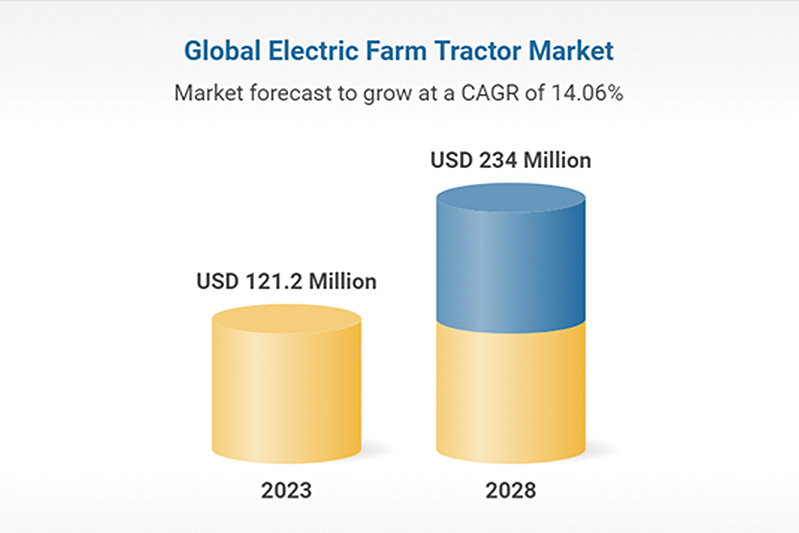The future looks bright for the adoption of electric farm tractors. Courtesy Photo
By Terry Tinkess
AgriNews Staff Writer
It shouldn’t be a surprise to anyone that the agriculture industry is seeing an increasing number of electric vehicles. They are growing in popularity in just about every sector.
While the electric farm tractor market was valued at $98.7 million in 2022, it is expected to reach $234 million by 2028, growing at a Compound Annual Growth Rate (CAGR) of 14.06 per cent between 2023 and 2028, according to a report prepared by ResearchAndMarkets.com.
The report determined there are several factors driving the electric farm tractor market. These include the increasing demand for sustainable agriculture practices from the agriculture industry, electrification and automation of agriculture machinery, and energy storage systems.
Electric farm tractors have registered an exponential surge in interest among farmers, manufacturers, and researchers from the agriculture industry, with sales of electric vehicles (EVs) reaching record heights.
Electric farm tractors are designed to replace conventional diesel or gasoline-powered tractors. They offer advantages such as reduced carbon emissions, lower operating costs, and quieter operation. By utilizing electric motors and batteries to power their operations, they eliminate the need for fossil fuels.
There are several methods of charging available for electric tractors, including traditional grid electricity, renewable energy sources such as solar or wind power, or even portable generators.
The increased use of electric power in farming machinery aligns with the global trend toward sustainability and reducing greenhouse gas emissions. Key benefits of electric farm tractors include environmental sustainability, operational efficiency, reduced operating costs, noise reduction, government incentives, and others.
Sustainable agriculture refers to farming practices that focus on producing food while minimizing the negative impact on the environment and preserving natural resources for future generations. In recent years, there has been a significant rise in awareness toward sustainable agriculture practices, with governments and farmers alike taking steps to reduce their environmental footprint.
Increased mechanization and technology adoption in agriculture has the potential to improve the efficiency, productivity, and sustainability of agricultural production. Mechanization and the adoption of smart farming technologies in agriculture can lead to increased efficiency in various farming operations, such as planting, harvesting, and processing. This can reduce labour requirements and improve the speed and accuracy of these tasks.
For electric vehicles to reach their full potential to combat climate change, the 2020s must be the decade of mass adoption of light electric vehicles. For this to happen however, there are obstacles that need to be dealt with.
An advanced farming ecosystem requires several things: access to electricity, the internet, and communication. Because there is lower population density in rural areas compared to urban areas, which means that there are fewer potential EV owners and less demand for charging infrastructure. As a result, building and operating charging stations can be less financially viable.
There is also the problem that electric vehicles, farm vehicles included, have a higher initial cost compared to traditional diesel tractors. Advanced technology such as electric motors, high-capacity batteries, and advanced power electronics come with a higher price tag. This is impacted by battery technology, power electronics, limited production volume, charging infrastructure, and research and development costs.
That there remains a dominance of conventional tractors is mainly because of their ability to offer a wide range of products and services to customers. The major companies have a strong network of dealers and service providers, allowing them to offer customers a full range of products and services, including financing, maintenance, and repair. They provide a comfort zone that many are not yet ready to venture from.
Tractors have come a long way from their early mechanical versions and are now highly sophisticated machines equipped with a range of advanced technologies. Advancements in technology have not only improved the efficiency of farm vehicles but have also made them more user-friendly and environmentally friendly. Change will occur, the only questions being how much and how fast.
For more information about this report visit https://www.researchandmarkets.com/r/skz9mo.













